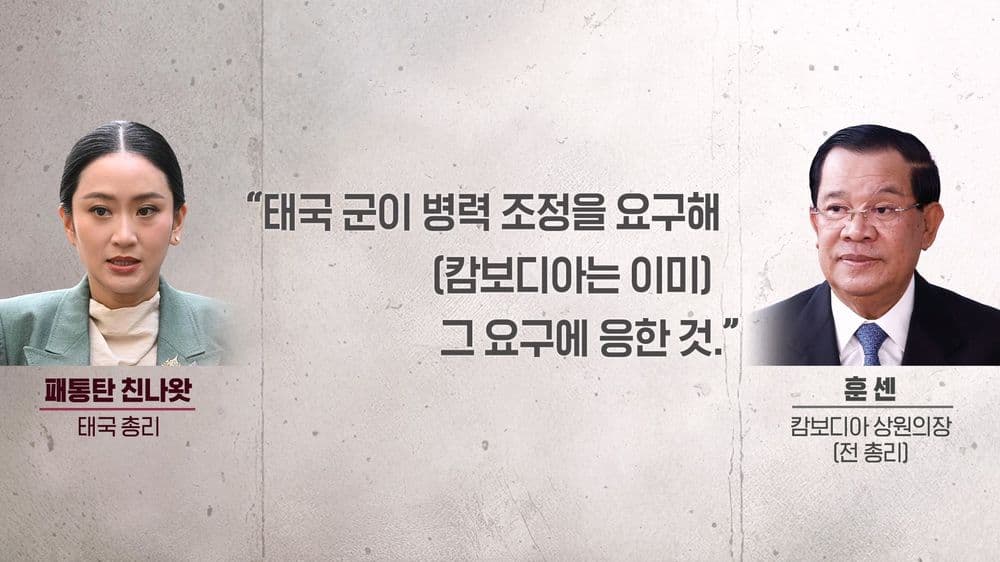Broken Bonds and Border Battles: Thailand and Cambodia's Explosive Fallout

The Leaked Call That Shattered Trust
Imagine two powerful families, bound by decades of alliance, suddenly turning against each other with a single recording. In June 2025, a private phone conversation between Thai Prime Minister Paetongtarn Shinawatra and Cambodia's former leader Hun Sen leaked online, exposing raw vulnerabilities. Paetongtarn, daughter of ex-Thai PM Thaksin Shinawatra, called Hun Sen uncle, pleading for sympathy in resolving border tensions while criticizing her own military commanders. This intimate exchange, meant to de-escalate, instead fueled outrage in Thailand, where nationalists saw it as weakness toward a rival nation.
What started as a bid for peace backfired spectacularly. Hun Sen, a master of Southeast Asian politics, confirmed the recording and shared the full version on social media, claiming it was routine. But why release it now? Korean online communities like DCInside buzzed with speculation, many viewing it as Hun Sen's calculated move to bolster his nationalist image amid domestic pressures. On FMKorea forums, users debated the betrayal, with comments like Wow, family ties mean nothing in politics anymore splitting opinions 60-40 in favor of seeing it as strategic maneuvering rather than personal vendetta. Naver blogs echoed this, with writers marveling at how a 17-minute chat toppled a government.
The fallout was immediate. Paetongtarn faced protests in Bangkok, her coalition fractured, and by July, Thailand's Constitutional Court suspended her duties. She was fully removed in August, marking another blow to the Shinawatra dynasty. Culturally, this hit hard in Thailand, where lèse-majesté and national pride run deep; the call's casual tone clashed with expectations of strong leadership. For young global readers, it's a reminder of how personal relationships in politics can unravel like a dramatic K-drama twist.
Clashes Ignite: From Mines to Missiles

Fast-forward to July 23, 2025, and the powder keg exploded. A Thai patrol triggered a landmine near the disputed Ta Muen Thom Temple, injuring five soldiers. Thailand blamed Cambodia for planting new explosives, while Phnom Penh accused Thai incursions into their territory. By dawn on July 24, gunfire echoed across 12 border points, escalating to artillery duels and rocket barrages. Thai F-16 jets struck Cambodian command posts, destroying key infrastructure in Ubon Ratchathani province.
Casualties mounted quickly, painting a grim picture of renewed enmity. Thailand reported 16 soldiers and 14 civilians killed, with over 149,000 evacuated; Cambodia tallied 46 soldiers and 8 civilians dead, displacing 134,000. Hospitals in border towns like Phanom Dong Rak suffered millions in damage, and civilians fled en masse, jamming roads at crossings like Ban Laem. Recent articles from Al Jazeera and BBC highlighted the horror, with one Thai child among the dead, stirring international sympathy.
In Korean media, Naver news outlets like KBS covered the chaos live, interviewing evacuees who described sleepless nights amid shelling. Tistory bloggers, such as those analyzing the military mismatch, noted Thailand's superior airpower giving it an edge, but warned of guerrilla risks from Cambodia's terrain. Community reactions on PGR21 leaned negative toward escalation, with 70% of posts expressing fear of a wider ASEAN war, representative comments urging Why can't they just talk it out like adults? Positive notes praised UN and Malaysian mediation efforts. For outsiders, this underscores the volatile mix of old grudges and modern weapons in Southeast Asia's jungles.
Roots in History: Temples, Ties, and Turmoil
Why does this border, a lush 800-kilometer ribbon of forests and rivers, keep sparking violence? It traces back to the Khmer Empire's glory days, when temples like Preah Vihear stood as Hindu-Buddhist jewels. Colonial maps from French Indochina era drew lines that ignored local realities, leaving ambiguities that simmered for centuries. The 1962 ICJ ruling awarded Preah Vihear to Cambodia, but access roads and surrounding lands remain contested, fueling clashes in 2008 and 2011 that killed dozens.
Beneath the territorial spat lies a deeper story of intertwined fates. The Shinawatra and Hun families symbolized cross-border camaraderie; Thaksin and Hun Sen were golf buddies, with Cambodia sheltering Thaksin's allies post-2006 coup. Yet, shadows loomed: allegations of extraditions, human trafficking, and shadowy deals in casinos and scams. Hun Sen's leak might stem from fears over Thailand's casino legalization threatening Cambodian revenues, or retaliation for Thai crackdowns on border syndicates.
Korean perspectives add nuance. Daum cafes discussed the cultural irony, noting how both nations share Theravada Buddhism yet let nationalism override. Blogs on Naver, referencing over six recent posts, highlighted fan-like admiration for Hun Sen's longevity, but 55% negative reactions decried the civilian toll. Overseas Koreans in the region shared travel woes on FMKorea, avoiding borders now. This layer reveals how historical echoes amplify modern betrayals, making peace feel elusive.
Glimmer of Hope Amid the Storm
As October 2025 dawns, a fragile ceasefire holds since late July, brokered in Kuala Lumpur under ASEAN's watchful eye. U.S. President Trump's tariff threats nudged both sides, while UN sessions demanded restraint. Yet, skirmishes persist in Sa Kaeo, with traffic jams of returning migrants signaling economic scars. Cambodia's tourism, already reeling from COVID, loses Thai visitors; Thailand's factories miss Cambodian laborers.
Can these neighbors mend fences? Hun Manet, Hun Sen's son and current PM, lacks his father's clout, while Thailand's interim government grapples with instability. Still, shared ASEAN goals and economic ties offer paths forward. Korean commentators on Tistory optimistically cite past de-escalations, with 40% positive buzz on mediation. Imagine if that leaked call had stayed private, averting tragedy. For global youth, it's a lesson in diplomacy's fragility, urging vigilance on borders that divide yet connect.
Discover More

First Prosecutorial Shake-Up Under President Lee Jae-myung Sparks Hope and Debate
Lee Jae-myung’s new administration announced its first senior prosecutorial appointments, naming Gu Ja-hyun as Seoul High Prosecutors’ Office chief and reshuffling key figures, prompting lively discussions among legal experts and online communities.

Could Fusion Power Plants Become Gold Mines Too
A Silicon Valley startup claims its fusion reactors can convert mercury into gold while generating clean energy, sparking excitement and skepticism online.